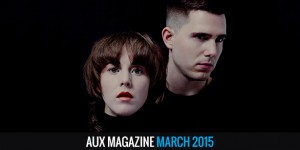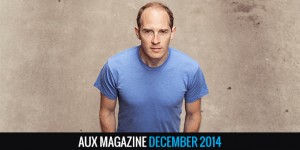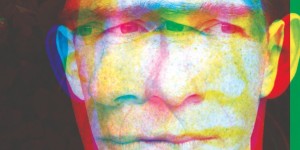Mac DeMarco talks self-help and the anxiety of being in the public eye
by Mark Teo
April 9, 2014
The last time we met up with Mac DeMarco, we were shocked: Camped out in his mom’s trash-strewn minivan on a tour stop in Toronto, the gap-toothed singer patiently fielded relentless streams of fans. Some, who may or may not have been underaged, begged him to sneak them into the 19+ venue in tears. Others, knowing DeMarco’s rep for bodily humour, asked him to spit on, not sign, their albums. One stayed in the front seat of the van while the interview took place. All wanted photos.
It was undeniably sweet—the “Ode to Viceroy” singer has nothing if not adoring fans—but it was also punishing, even to us. But he handled himself graciously: The attention was a tad obtrusive and the requests were obnoxious, but DeMarco never shed his gap-toothed grin. If he was tiring of the act, it wasn’t showing.
Fast forward four months. DeMarco’s long-awaited follow-up to 2—the album that catapulted him into the international spotlight with its warped-vinyl sound—has dropped, and in many ways, Salad Days is a surprise: Though he still fiddles with junkshop effects pedals, its production is clearer, sounding less like a damaged, decades-old T-Rex LP. Though he’s still lighthearted, his albums speak of decidedly adult themes: Exhaustion, fatigue, substance abuse. And though it’s early, most every critic’s applied a descriptor most wouldn’t ever expect: Mature.
Salad Days is largely about the anxiety of being in the public eye. “The album was kind of like reflective,” he says. “It’s kind of like self-help for myself, by myself.”
It’s easy to see why: after toiling for years in Edmonton, Vancouver, and Montreal’s underground, everyone suddenly knows the ever-approachable Mac: They know about his obsession with pinball, his early press photos in drag, the story about how he got scabies. We recently spoke again with DeMarco to talk the joy, perils, and exhaustion of being Canada’s unlikeliest star.
AUX: We’re using a photo of you being showered with cigarettes in this story. Where’d you get that idea?
Mac DeMarco: It happened on a trip to Australia. Somebody had [the whole shot] set up. And they were like, “Do you want to take this photo?”
So what, did they just spray a shotgun blast of Pall Malls at you?
[Laughs] Well, the photographer had them all hanging on fishing wires. I was in a forest of cigarettes. She also did another shot where I was sitting in a bathtub full of cigarettes. They were planning on filling the whole thing with water, so the cigarettes would float at the top. But I think that’d give you nicotine poisoning through your skin, so we didn’t do that. I actually haven’t even seen that photo yet, maybe it hasn’t been released yet.
Ew. So gross. So you live in Brooklyn now, right? Do you miss Montreal at all?
Not at all. Well, I miss my friends and stuff. But I’m okay with it down here—we’d been toying with the idea for a bit. Me and my girlfriend had packed our stuff when we were getting ready to leave on tour, and we got rid of our apartment, and put everything in storage. We were just like, “When we get back from tour, we might as well live somewhere else.” Then, turns out, it was Brooklyn.
Sonically, Rock ‘n’ Roll Nightclub and 2 were incredibly distinctive albums. What was your M.O. for Salad Days?
It was kind of like, not the same as the last record. I didn’t make a huge jump like I did with Rock ‘n’ Roll Night Club, and some people were expecting me to do a whole Bowie-style changeup again. I just tried to make the most natural album I could. Maybe it’s more personal, more specific to me—it was an account and reflection on how crazy things have been for the last while.
People have been calling Salad Days mature. Do you think that’s the right descriptor for the album?
I’m OK with that!
Do you think you’re actually more mature, though?
Well, I’m not going to change the way I act in public. [Laughs.] With touring, shit’s gotten pretty crazy in the last year and a half. When I was writing the album, I was feeling kind of jaded, burnt out, and like just, I was like, “Fuck this shit! It sucks!” A lot of the time, I was catching myself acting like that, and then being like, “What are you doing? You’ve been working at this for years, and now it’s happening for you and you’re acting like a little baby.”
Were you, though? The last time we saw you play, people were constantly approaching you—they wouldn’t leave you alone. It felt exhausting. To us, at least.
It definitely is. But I can’t complain about it, because it’s a real blessing. I mean, I don’t have to work a job, and people are genuinely listening to my music and enjoying it.
Does that make you fetishize your alone time, though? “Pieces of Me” certainly makes it seem like you need time to recoup.
Oh yeah, I love it, because I never have it anymore. When I have enough time alone to record, it’s kind of like a meditation for me. Before, it was like, “Well, I got fired from my job. I guess it’s time to make a new album.” Then, I’d spend the rest of the time writing until I had to get another job. But now, it’s like, [the music industry] is my life, and when do I get the chance to do write? It’s crazy. It’s such a treat now. It’s definitely my fetish, yeah.
“Goodbye Weekend” is another uncharacteristically somber song. What’s it about?
It’s about a lot of things I shouldn’t talk about in my life. It’s more about, abuse counselors and stuff—substance abuse counselors. It’s also kind of about preconceptions people have about me. It’s just another aspect of being a weird, public…. thing. It’s so fucked up.
Do you find it weird that people know so much about your personal life—like, your relationship with your girlfriend, for example?
Well, yeah. Some people are crazy, but at the same time, some people are just some people. I can’t look down at it much, but I also can’t understand it. It’s fucked up! I get approached by a lot of people, and a lot of people have assumptions [about how I’ll act] before they’ve even met me. People do it out of intrigue, which is understandable, but to treat a human like that feels kind of weird. Personally, I’d never do that to somebody!
So, beyond touring, what are your plans for the coming year?
Keeping it as fresh as possible.
Remembering the salad days: 7 Mac DeMarco related bands
While Mac DeMarco’s ascent to stardom feels meteoric, outside of the spotlight, he’s been honing his loboto ditties—and refining his signature jizz jazz—for years. But across a half decade and four cities, DeMarco’s established himself as one of Canada’s most influential musicians: His warped, wobbling aesthetic continues to inform musicians like Travis Bretzer. His pals are getting record deals: Longtime collaborator Alex Calder’s on Captured Tracks, while current guitarist Peter Sagar is soon cutting an LP with Montreal’s Fixture Records. Indeed, the scene Mac cultivated helped shape Canadian music as we know it—thanks, largely, to these 7 bands.
Outdoor Miners
DeMarco had several high-school bands, like the Sound of Love and the Meat Cleavers, but Edmonton-based Outdoor Miners were the first of DeMarco’s bands to achieve cult status. The band, named for a Wire song, played a brand of slopped-out garage—very of-the-moment in Alberta—and, at the turn of the 2010s, was largely considered one of the province’s best.
Sans AIDS
Around the same time Outdoor Miners reigned, DeMarco’s right-hand dude, Peter Sagar, was busying himself with Sans Aids, a project who cut cassettes with Wild Rose post-hardcore label Bart Records. Their sound was also highly regionalized: Incorporating touches of post-Women post-punk with a ‘90s slacker obsession, Sagar slotted in easily alongside Northern Alberta acts like Brazilian Money.
Makeout Videotape
This project, headed by DeMarco and drummer Alex Calder, began in Edmonton and was fully realized in Vancouver. While still exhibiting touches of garage, the project featured plenty of DeMarco’s signatures: The infectious, hummable melodies, the deadpan croon, the class-clown humour, and reverb-drenched guitars. Of note: Their classic cassette, Yin Yang, was cut by Totally Disconnected, a label run by Psychic Handshake’s Mike Deane and Weird Canada’s Aaron Levin when both lived in Edmonton.
Collage Party / Alex Calder
Before Calder signed on with Captured Tracks, he wrote work as Collage Party, his Montreal-based project. In 2012, he released Suki And Me, displaying what he brought to the equation: though the goofy slacker vibe still prevailed, Calder was the driving pulse of Makeout Videotape. After dropping the moniker, Calder cut the Time EP with Captured Tracks.
Walter TV
Walter TV is often referred to as Mac DeMarco’s other band—but they’re not. The project, in fact, is the brainchild of Pierce McGarry, an L.A.-based member of DeMarco’s band. Walter TV’s Appetite LP veers between disorienting post-punk and self-healing new age —a perfect combination of McGarry’s Alberta past and his current musical fixations.
Homeshake
Peter Sagar’s newest project has little to do with Sans Aids. Instead, through a series of cassettes, Homeshake unveiled his lobotomized take on R&B, occasionally veering off onto dumpy new age and hip-hop tangents. Expect to see an LP issued via Fixture this spring.
Mac DeMarco
After moving from Vancouver to Montreal, DeMarco dropped the Makeout Videotape moniker, electing to use his given name. His first Captured Tracks release was Rock ‘n’ Roll Night Club, a pitch-shifted masterpiece that had DeMarco coming across as a demented Elvis impersonator. Then, 2 happened, and the rest is history.

This article originally appeared in the April 2014 Issue of AUX Magazine.
Download and subscribe for free in the app store.
Tags: Music, Cancon, Featured, Interviews, Alex Calder, AUX Magazine, AUX Magazine April 2014, Interviews, Makeout Videotape





